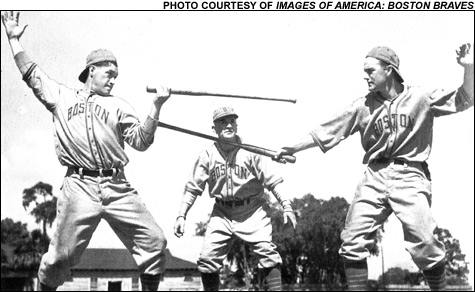
PLAYFUL RIVALS: Buddy Hassett and Elbie Fletcher vied for first base on the late ’30s Boston Bees. That’s manager Casey Stengel in the background. |
Fifty years ago this fall, a Boston team beat the Yankees in the World Series. Fifty-five years ago, a Boston team signed the greatest home-run hitter who ever lived. Fifty-seven years ago, a Boston team became one of the first in the major leagues to integrate — and its first African-American player went on to win the Rookie of the Year award. That team, obviously, was not the Red Sox. That team was the Boston Braves.
That is, they used to be the Boston Braves, though by the time they achieved these milestones they had moved to Milwaukee — lured by a new stadium and a baseball-hungry fan base after several seasons of paltry attendance in Boston — and then later Atlanta, which they currently call home.

In 1953, after 76 seasons of baseball in the Hub, Boston’s other baseball team — Boston’s first baseball team — packed its bags and balls and planted home plate in the Midwest. It was front-page news: a baseball team hadn’t relocated in more than 50 years. This was, of course, four years before two New York teams — the Brooklyn Dodgers and the New York Giants — infamously left Gotham for, respectively, Los Angeles and San Francisco. But while the Dodgers remain part of Brooklyn’s founding myth, a mourned fragment of the city’s identity even today, the Braves have all but disappeared from Boston’s cultural memory. This despite the dogged efforts of a few hundred fans, some of whom still insist that the wrong team left town in 1953.
The Braves — known first, in 1876, as the Red Stockings or Red Caps, then variously as the Beaneaters, the Doves, the Rustlers, and the Bees — weren’t always a competitive squad. (Hell, even with future Hall of Famers George Sisler and Rogers Hornsby on their roster in 1928, they finished in second-to-last place with 103 losses, 44 and a half games out of first.)
But though their players often struggled on the field, the Braves franchise itself laid the groundwork for much of what we take for granted in baseball today: Sunday and night games, television and radio coverage, fan-appreciation days, even new uniform styles. They opened what was at one time the largest stadium in the majors. They were progressive on racial issues when the Red Sox were anything but. And they created the Jimmy Fund, which benefits Boston children with cancer.
“The Braves were always trying harder,” says Sports Museum of New England curator Richard Johnson. “They introduced satin uniforms because they looked better on TV. They lowered the field by two and a half feet, so the sightlines would be better. They introduced different items on the menu, like fried clams. The kind of stuff the Red Sox are doing now.”
Nowadays, Fenway is perpetually sold out, and it costs $315 for a family of four to watch a game. Back then, the Braves were quintessential working-class heroes: the players were underpaid underdogs; the stands were often all but empty; and kids were admitted for free. Those kids are now old men, but many of them still follow their team religiously — even as it plays in Atlanta (the Atlanta Braves come to Fenway on May 18). And they remember a time when Boston was a two-team town.
Cult of personality
The old Braves Field, built in 1915, was bulldozed long ago, but its right-field pavilion still stands, incorporated into the structure of BU’s Nickerson Field. Outside it stands a plaque, which proclaims that “the fans of New England will never forget the exploits of their Braves and the fond memories associated with Braves Field.”
Would that it were so. Several years ago, Johnson, who’s written books about both Boston baseball teams, remembers getting a call from a local sports-media figure who shall remain nameless: “Gee, could you tell me, when did the Braves become the Red Sox?” Johnson was dumbfounded. “It took me 10 minutes to explain that there were two teams.”
The story of the Boston Braves begins in 1870, five years after the Civil War. The Cincinnati Red Stockings of the National Association of Base Ball Players, who’d become the first completely professional team the previous year, voted to disband. So the Stockings’ Harry Wright, an English former cricketer (who more or less invented the job of team manager), his younger brother George (who more or less invented the position of shortstop), and a few other players decided — drawn by the Hub’s renown as a baseball hotbed — to move to Boston.
When the National Association dissolved in 1876, the team became a charter member of the new National League. Tracing its origins back to that first season in 1871 right up to the present-day in Atlanta makes it the oldest continuously playing team in American professional sports.